Photo: VCG/Getty Images
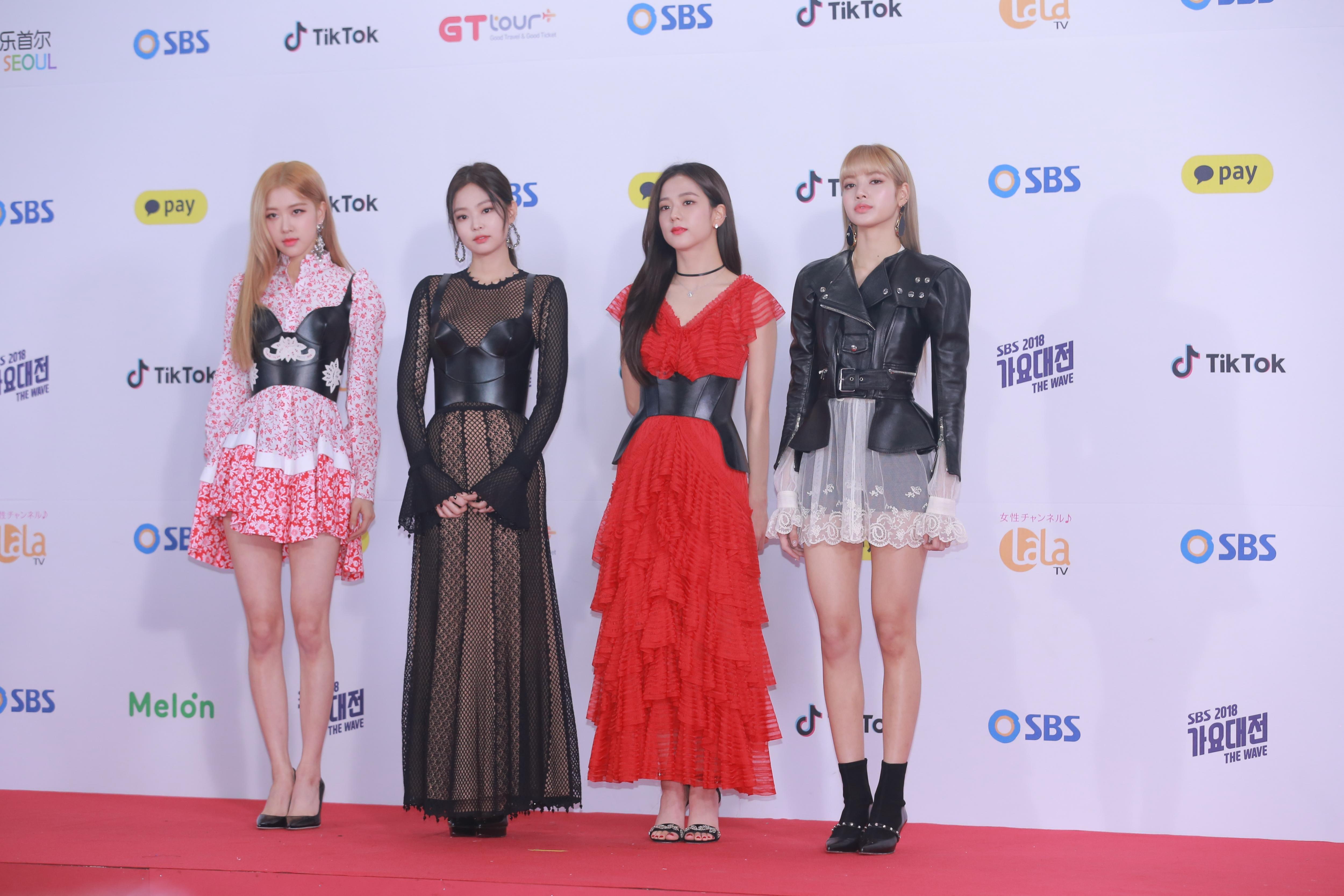
BLACKPINK
news
Meet BLACKPINK: The Latest, Greatest K-Pop Phenomenon
Inside the all-female quartet's pristine pop/hip-hop hybrid sound, stunning viral visuals, and impending global takeover of the music world
As Korean pop rounds the bend from its smash crossover breakout year in 2018, led by international phenoms BTS, into a sky's-the-limit 2019, the American mainstream is getting to know a few more names around the household.
Enter BLACKPINK: With an enviable fan army known as "Blinks" and nearly 600 million (!) views on their eye candy-coated video for "DDU-DU DDU-DU," the pop quartet are anything but underground. Their international star only continued to rise when Coachella announced its 2019 lineup earlier this week, with BLACKPINK being the first all-female K-pop act to play the Southern California desert fest.
<iframe width="620" height="349" src="https://www.youtube.com/embed/Amq-qlqbjYA" frameborder="0" allow="accelerometer; autoplay; encrypted-media; gyroscope; picture-in-picture" allowfullscreen></iframe>
But their Coachella milestone and devout online infantry are only the beginning of BLACKPINK's western takeover. On Jan. 9, YG Entertainment, the group's company, announced that BLACKPINK’s In Your Area 2019 world tour will hit North America, Europe and Australia after several already planned tour dates throughout Asia. While the new dates and venues are yet to be revealed, the international scope of their momentum is undeniable. At this point you're either in-the-know or asking: who are BLACKPINK?
BLACKPINK have been making ridiculously catchy music since 2016
As a group, Jennie, Rosé, Jisoo and Lisa came from diverse international backgrounds, with Jennie, Rosé both spending time in New Zealand, Lisa hailing from Thailand and Jisoo as the only member who has not lived extensively outside of Korea. Collectively, they arrived into K-pop's consciousness back in 2016 with their SQUARE ONE, SQURE TWO and "As If It's Your Last" offerings, which introduced their hybrid of sugary K-pop with danceable Latin trap and hyped up hip-hop, a concoction referred to by some as "K-trap."
But what sets BLACKPINK apart is production quality on all fronts, as theirs is a look and sound striving for perfection.
<iframe width="620" height="349" src="https://www.youtube.com/embed/FzVR_fymZw4" frameborder="0" allow="accelerometer; autoplay; encrypted-media; gyroscope; picture-in-picture" allowfullscreen></iframe>
Consider "Stay," from 2016's SQUARE TWO three-song sophomore EP, a pensive yet peppy ballad that could be dropped seamlessly into virtually any major U.S. brand ad campaign. And as K-pop is traditionally a very visual-heavy genre, the song's video reflects this cross-continental appeal, with its imagery of blighted corporate America complete with a poignant Easter-egg Talking Heads' "Heaven" lyric lettered on the broken down backdrop's theatre marquee, all under a track that's equal parts longing and hopeful. Even in its mess of heartache and rubble, there's not a hair—or a note—out of place.
Exhibit B: the follow-up single, "As If It's Your Last," flaunts meticulously crafted sections with Lisa's stuttered-and-sliced (and all-English) rap sequences building into a soaring melodic pre-chorus before slamming into the hook. Each new musical idea is painted in its own unique temple, all arranged together in a common garden of song, making for a pleasing mix of variety and profluence. From the beginning, the creative powers behind BLACKPINK have struck this same delicate balance of intrigue and accessibility global pop music demands.
Vivifying their voices and mastering their moves on "DDU-DU DDU-DU"
The group's evolution toward perfect pop onomatopoeia is on full display in their breakout 2018 single, "DDU-DU DDU-DU," which features buoyant beats and an irresistible hook. Audiences clearly love it too; its music video is nearing 600 million views on YouTube, and the song became the highest-charting song by an all-female K-pop group on the Billboard Hot 100, entering the chart at No. 55 back in June. Unsurprisingly, the song hiked all the way up to No. 1 on South Korea, Singapore and Malaysia, while hitting No. 2 in New Zealand and No. 7 in Japan.
<iframe width="620" height="349" src="https://www.youtube.com/embed/IHNzOHi8sJs" frameborder="0" allow="accelerometer; autoplay; encrypted-media; gyroscope; picture-in-picture" allowfullscreen></iframe>
"DDU-DU DDU-DU" also debuted at No. 1 on the Billboard World Digital Song Sales chart and on its Emerging Artist chart, becoming the first all-female K-pop act to accomplish the feat.
BLACKPINK's American takeover hits full throttle
As the rest of the world began to take notice, Interscope Records and Universal Music Group took action, signing the group in October of 2018 to represent them outside of Asia. If a major label deal isn't a signpost to success in a country the group has not yet even performed in, what is?
On Nov. 23, 2018, BLACKPINK dropped a nine-song collection of singles constituting their full-length debut, BLACKPINK IN YOUR AREA, named after the group's tagline with the aforementioned banger "DDU-DU DDU-DU" as the lead single.
BLACKPINK also bolstered their rolodex in 2018, collaborating with GRAMMY-nominated British songstress Dua Lipa for "Kiss And Make Up" from the complete edition of her self-titled debut, further deepening their cross-over campaign to an international audience. Like their male counterparts BTS, BLACKPINK maintain the highest pop production of both their music and their videos, giving them seemingly limitless potential for audience accumulation.
BLACKPINK have already won a ton of awards
Furthermore, if BLACKPINK's domestic success at home is any indication, the group's global future is blindingly bright. In the past two years they've won 23 awards and been nominated for a whopping 90 (and counting), including several Goan Chart Music Awards, Melon Music Awards and Mnet Asian Music Awards, all major music awards shows in South Korea. Their first Mnet honor came back in 2016 for Best of Next Artist (Female), proving the critics were on board since day one.
Even better news for the group, the American audiences they are primed to overtake have shown strong streaming habits for hip-hop, a perfect fit for BLACKPINK's leaning into rap to counterbalance their pop appeal. Now, with an ever-growing fan army, a litany of awards under their belts and enough buzz to light up the night sky in pink neon, 2019 appears to be BLACKPINK's to take.
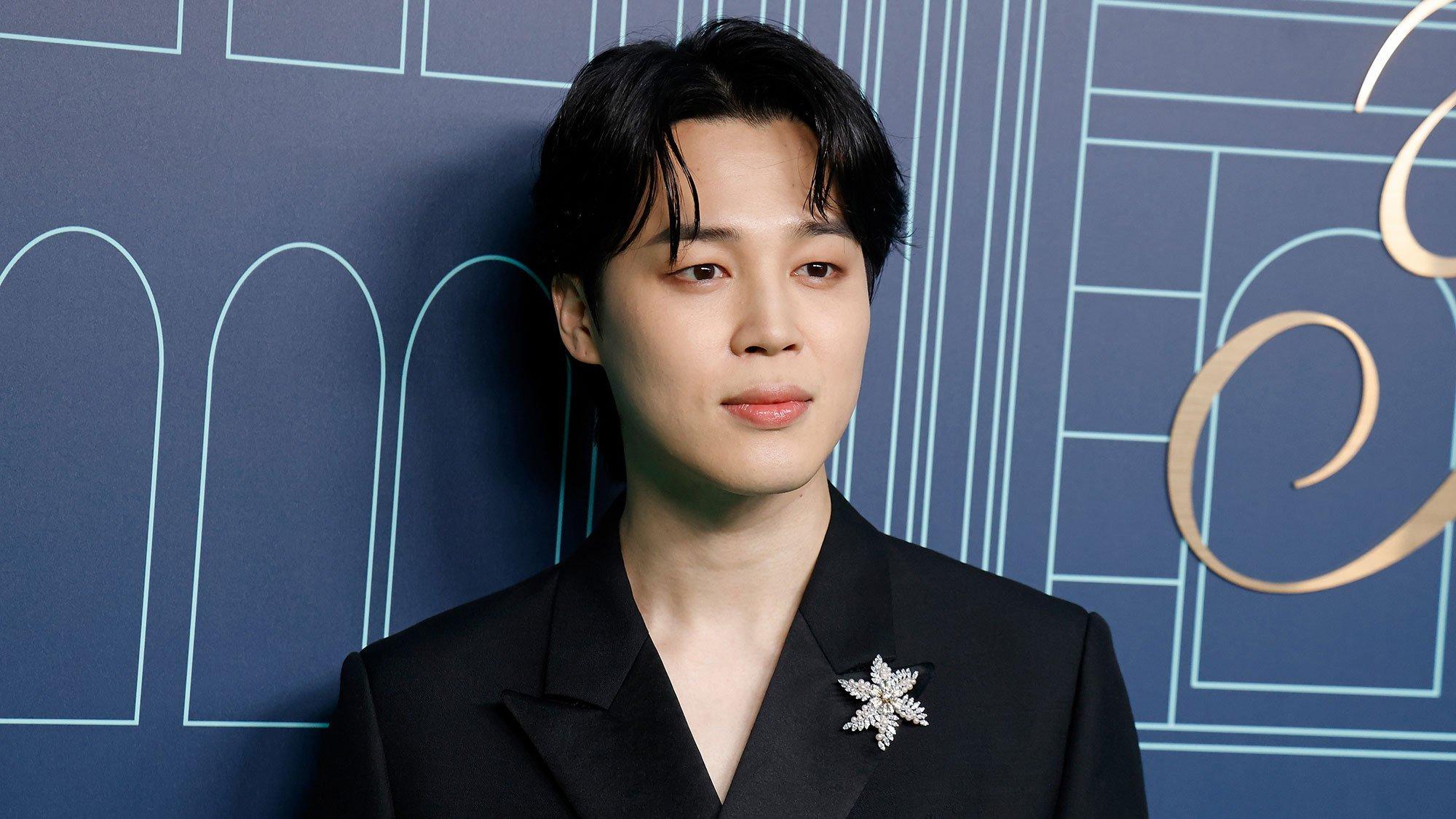
Photo: Taylor Hill/Getty Images
list
5 Takeaways from BTS Jimin's New Album, 'MUSE': A Bold Exploration Of Love And Inspiration
Jimin's second solo project, 'MUSE,' showcases his artistic growth and versatility, featuring a blend of nostalgic sounds, personal reflections, and standout collaborations.
K-pop juggernauts BTS are still on hiatus due to military enlistments, except for Jin, who was discharged last month. Yet, all members remain booked and busy in their solo endeavors.
Documentaries, travel shows, special singles — you name it, they carefully prepared it before starting their duties. And after new records from j-hope (HOPE on the Street) and RM (Right Place, Wrong Person) this year, the next in line is Jimin, who dropped MUSE today.
The album comes almost a year and a half after his debut EP, FACE, which placed Jimin as the first South Korean soloist to top Billboard's Hot 100 chart. In it, the Busan-born star proved his versatility and prowess standing on his own, captivating audiences old and new with his sensitive charisma.
In MUSE, Jimin introduces a new facet of his musical identity: bolder and more confident, but still a big softie at heart. To celebrate the beginning of a new era — and to ease the wait until his discharge next year — here are five key takeaways from Jimin's latest release, MUSE.
It's Another Jimin-Led Production
FACE was a proper introduction to Jimin's artistic vision, with him contributing to every aspect of the project and co-writing all of its tracks, minus the instrumental "Interlude: Dive."
Now, he takes it up a notch for MUSE, showcasing his growth by co-writing six out of seven tracks, and co-producing two of them: "Rebirth" and "Interlude: Showtime." Once again, Jimin had a hand on all of the album's components, including its concept and visuals, and bore down another layer of his ever-evolving skills.
If FACE introduced us to a vulnerable and sometimes desperate Jimin, MUSE charges forward with main pop boy energy, tender but commanding, sweet but sassy. It works both as a gift to fans and a tool to get to know Jimin even deeper.
He’s Still In Search Of His Muse
"We never met, but she's all I see at night/ Never met but she's always on my mind/ Wanna give her the world/ And so much more/ Who is my heart waiting for?" Jimin sings in MUSE's track, "Who." As the lyrics suggest, MUSE's main theme is Jimin's journey to find the source of his inspiration — his muse.
The album's seven tracks are all interconnected by love and longing, with Jimin searching for the one but getting lost in the way, and back at it once more. Through this perspective, he continues his path of self-discovery. After looking at his own FACE in the mirror, who else does he see? Who else instigates him enough to make art?
A Stellar Team Backs Up The Effort
To write and produce MUSE, Jimin enlisted longtime collaborators Pdogg, Ghstloop, Evan, and Supreme Boi. They have also been working with BTS for years, and know just what Jimin wants and needs in his songs.
But to make this album even more special, Jimin also collaborated with a fresh crop of professionals. Lead single "Who" was co-written and co-produced by Jon Bellion, Pete Nappi, and Tenroc, while Ayo the Producer and Kofo co-signed the fan-dedicated "Closer Than This." OneRepublic's Ryan Tedder helped pen "Be Mine," and Tommy Brown has writing credits on "Rebirth" and "Smeraldo Garden Marching Band (feat. Loco)."
Aside from Korean rapper Loco, MUSE also features American actress and singer Sofia Carson on the smooth duet "Slow Dance." Together, these names assembled a cohesive, yet diverse LP, brimming with influences from several decades, genres, and countries at once.
The Smeraldo Flower Makes A Comeback
Back in 2017, when BTS was in their LOVE YOURSELF era, they also introduced to their lore a fictional blue flower named Smeraldo. Symbolizing "a truth that cannot be told," its legend was better explored in the track "The Truth Untold (Feat. Steve Aoki)," and offered important clues to understanding that era's messages.
However, as years passed, the Smeraldo flower was largely forgotten from BTS's new works — until MUSE. Here, Jimin brings back the blue flower as one of the albums' visual concepts, and as the main motif behind pre-release "Smeraldo Garden Marching Band (feat. Loco)."
According to a press statement, the track's lyrics "express the longing to confess and find love on behalf of those unable to articulate their feelings," hence the use of Smeraldo. As for its curious title — loosely inspired by The Beatles' 1967 album Sgt. Pepper's Lonely Hearts Club Band — it came first as a casual nickname between Jimin, Pdogg, Ghstloop, and Evan while they worked together on FACE, and eventually became real.
It’s Packed With Nostalgia
If you miss Justin Timberlake's Justified sounds and other early-2000s gems, MUSE is here to take you on a nostalgic trip. Inspired by pop, R&B and hip hop from that era, Jimin gave his latest album a vintage, cozy veneer.
These references are predominantly visible on "Who" and its delightful guitar strums, but "Slow Dance (feat. Sofia Carson)," for example, sounds like an updated version of Usher and Alicia Key's "My Boo," and "Be Mine" could be the 2020's lovechild of Santana's "Maria Maria" and Sean Paul's "I'm Still In Love With You."
Another strain of references can be seen in "Smeraldo Garden Marching Band (feat. Loco)," which extends The Beatles' inspiration to experimental samples and marching band percussion, and creates a quirky piece that strays away from any current trends. "Interlude: Showtime" drinks from the same source, featuring a circus brass and drum line that introduces us to the singularity of "Smeraldo Garden."
While infused with nostalgia, MUSE still appeals to today's tastes, and offers a seamless, polished listen. It stands as a testament to Jimin's artistic growth, and while he might not have found his muse yet — he is certainly a source of inspiration for many.
More BTS News
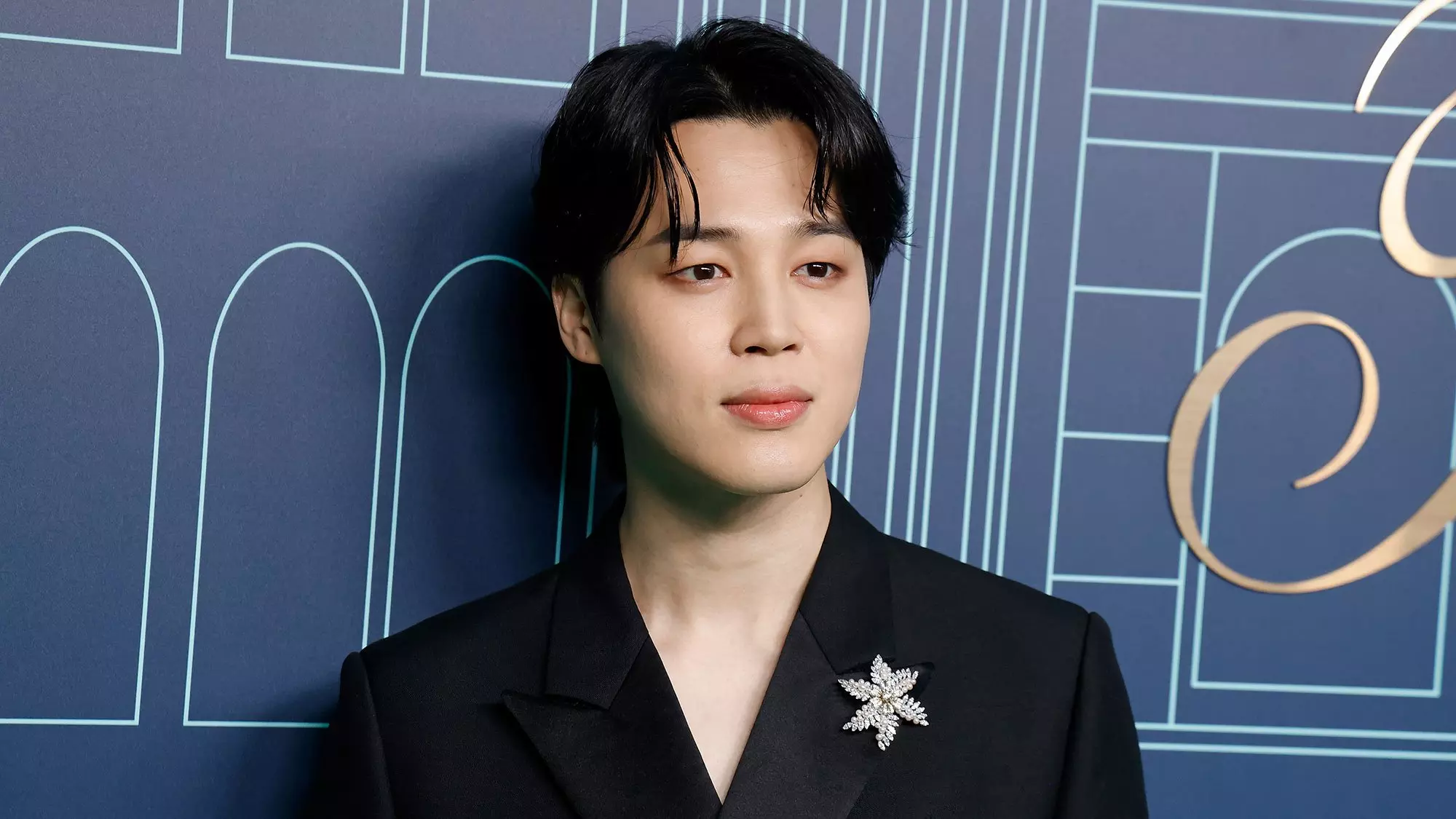
5 Takeaways from BTS Jimin's New Album, 'MUSE': A Bold Exploration Of Love And Inspiration

GRAMMY Museum Partners With HYBE For New K-Pop Exhibit 'HYBE: We Believe In Music' Opening Aug. 2
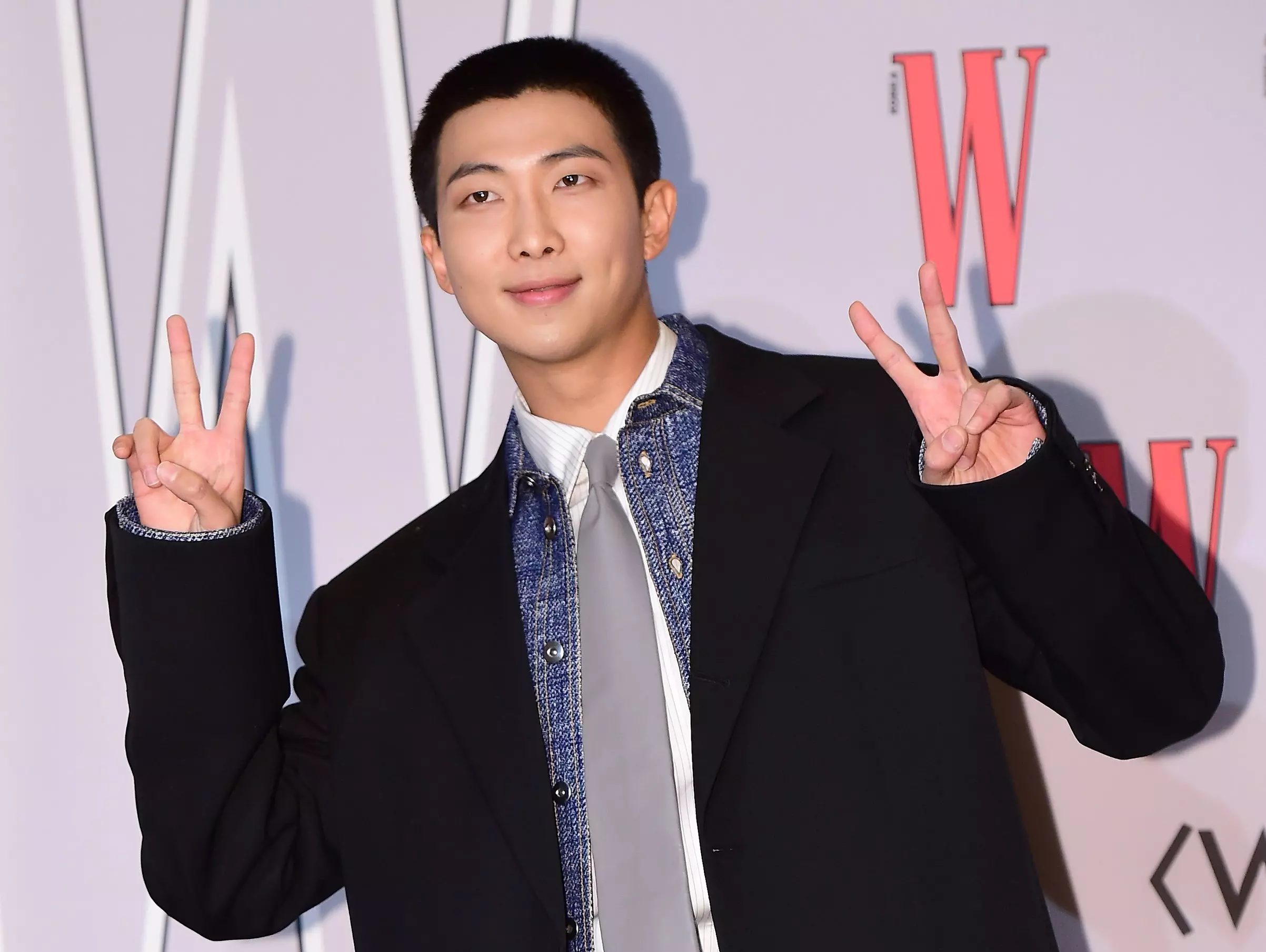
Stream RM's New Album 'Right Place, Wrong Person': See The Tracklist, "LOST!" Video & Special Guests
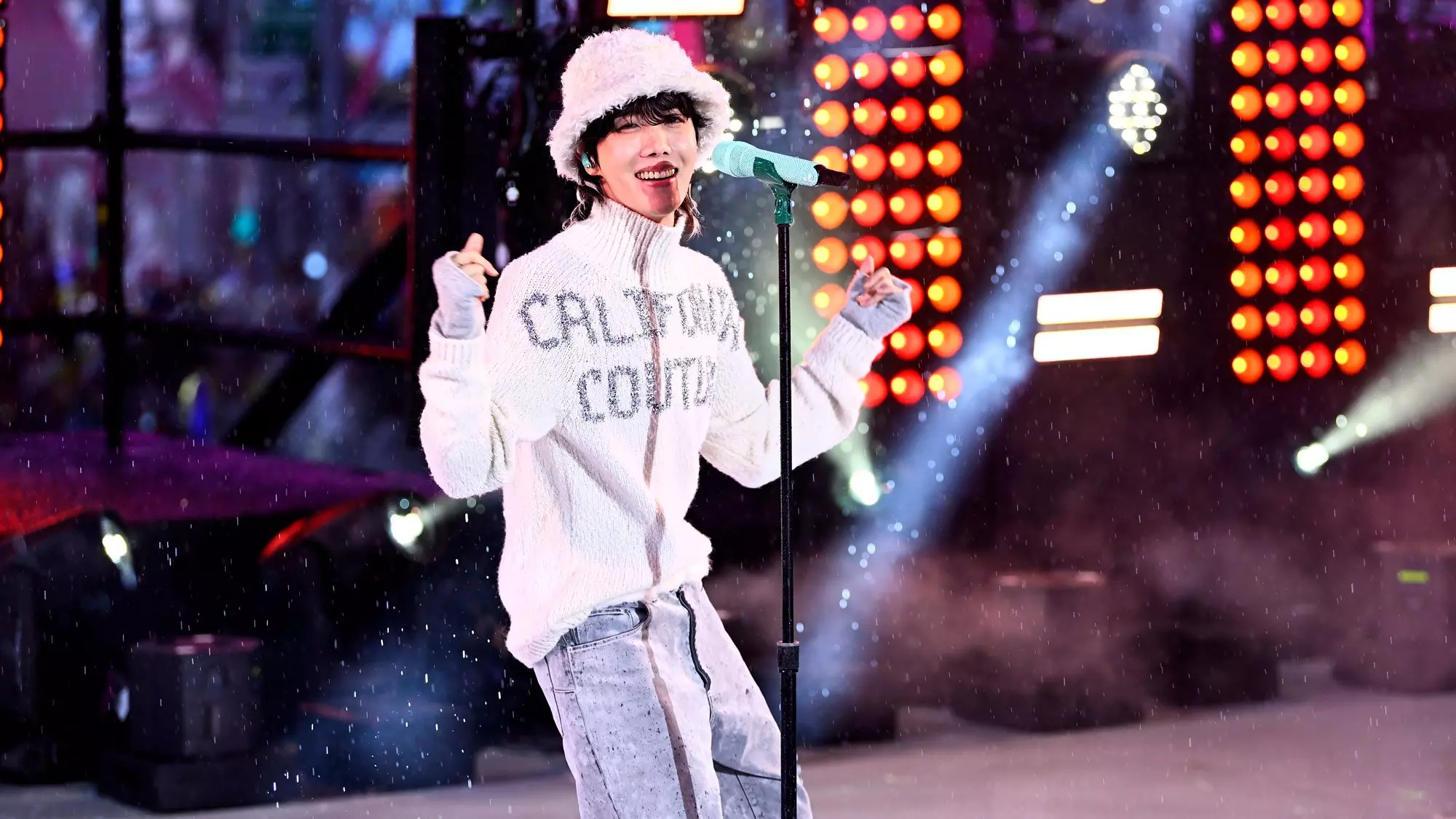
J-Hope's Road To 'Hope On The Street Vol.1,' From Falling Back In Love With Dance To Tying Together His Global Influences
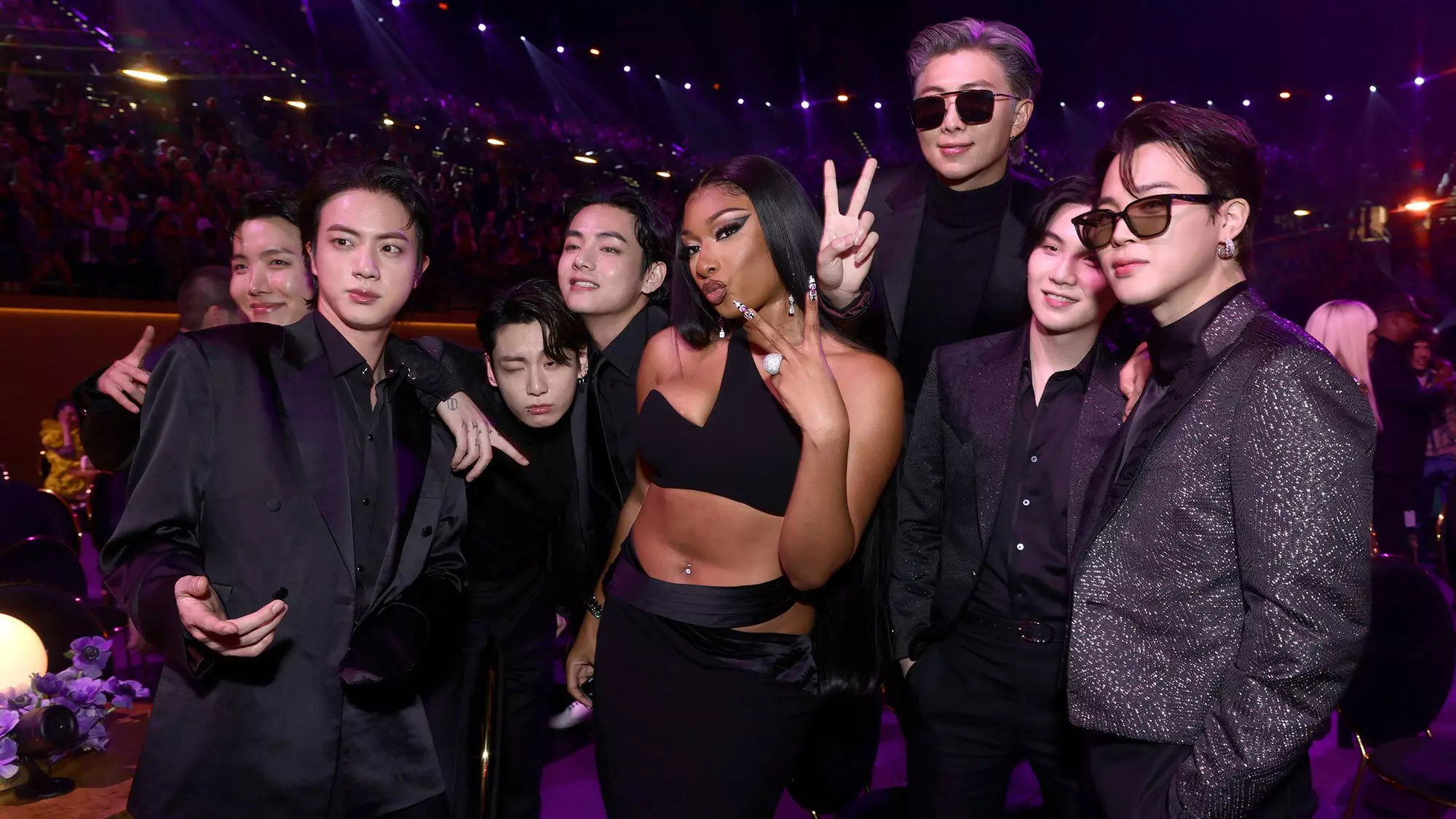
9 Essential K-Pop/Western Collabs: From BTS And Megan Thee Stallion, To IVE And Saweetie
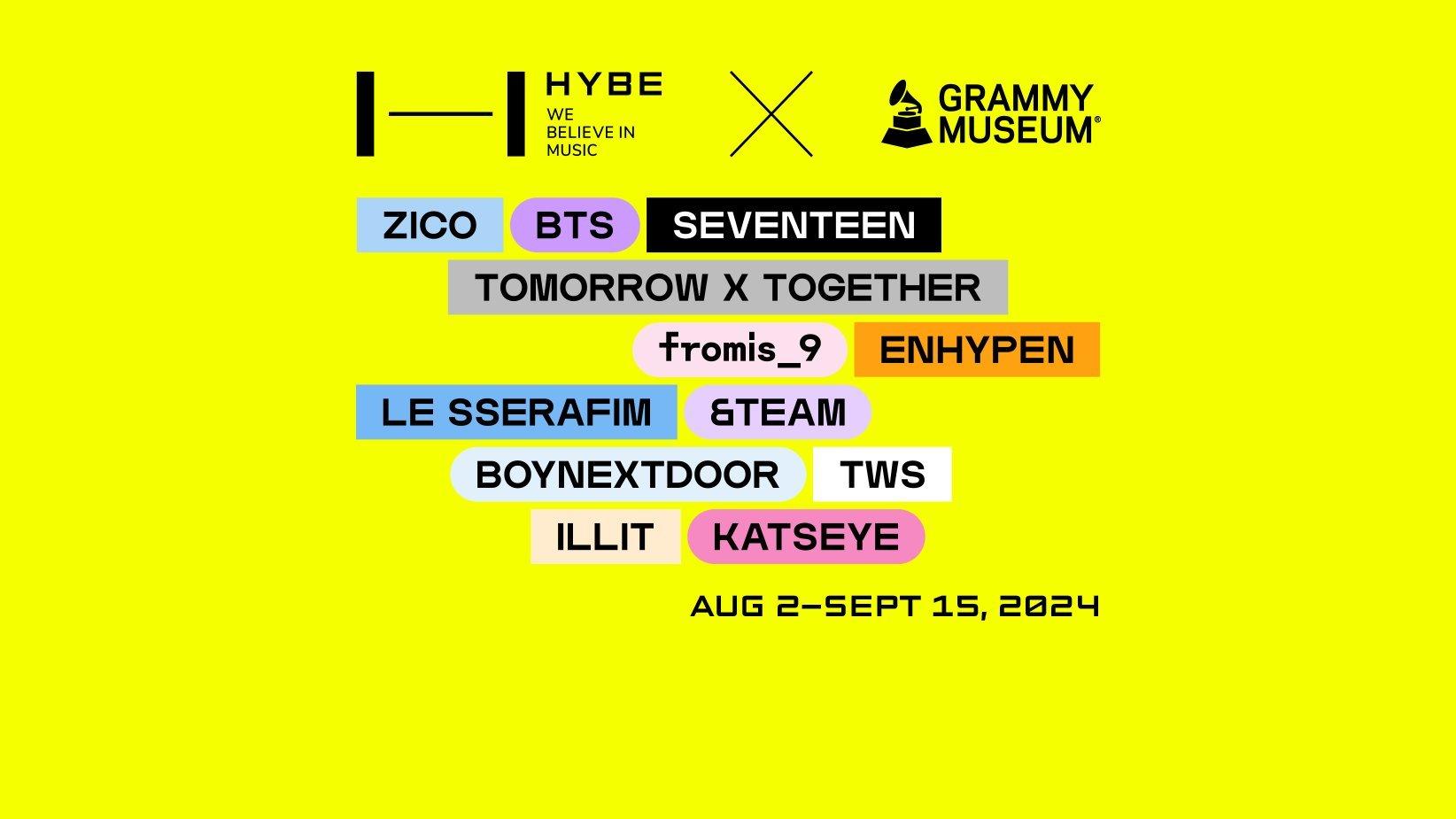
Graphic courtesy of the GRAMMY Museum
news
GRAMMY Museum Partners With HYBE For New K-Pop Exhibit 'HYBE: We Believe In Music' Opening Aug. 2
Running Aug. 2 through Sept. 15, the GRAMMY Museum exhibit showcases artifacts from superstar HYBE artists, including BTS, SEVENTEEN, TOMORROW X TOGETHER, ENHYPEN, LE SSERAFIM, and many more.
The GRAMMY Museum joins forces with HYBE to present its newest exhibit, HYBE: We Believe In Music, A GRAMMY Museum Exhibit. This interactive exhibit chronicles the history and impact of HYBE, and showcases its legacy of unparalleled innovation and creativity as a trend-setting global entertainment brand.
The exhibit opens on Aug. 2 in downtown Los Angeles and features spotlight moments with K-pop stars BTS, SEVENTEEN, TOMORROW X TOGETHER, ENHYPEN, LE SSERAFIM, and many more. "HYBE: We Believe In Music" runs through Sept.15. The exhibit will kick off on Aug. 1 with "Global Spin Live: TWS," a program featuring a moderated conversation with K-pop group TWS, followed by a performance.
The exhibit traces HYBE's evolution and influence by showcasing instantly recognizable artifacts from its roster of artists, creators, and fans. The displays notably feature original outfits worn in iconic music videos such as "Yet To Come (The Most Beautiful Moment)" by BTS, "MAESTRO" by SEVENTEEN, "Sugar Rush Ride" by TOMORROW X TOGETHER, "Sweet Venom" by ENHYPEN, and "EASY" by LE SSERAFIM. HYBE: We Believe In Music also boasts accessories and performance gear donned by ZICO, fromis_9, BOYNEXTDOOR, TWS, &TEAM, and ILLIT. The exhibit marks the first time these artifacts will be on display together in one location.
Other highlights include interactive sing-along and dance rooms, a dedicated Fan Section celebrating the endless support between HYBE artists and their fandoms, a Mono to Immersive room featuring BTS's 2022 GRAMMYs performance of "Butter," and a Photoism Booth that allows visitors to pose alongside their favorite K-pop artists. The GRAMMY Museum exhibit will also feature exclusive video content with producers, artists, music videos, and more.
"HYBE and their artists represent the present and future of the global music landscape, and our goal with this exhibit is to deepen the appreciation and respect for its creators and performers," says Michael Sticka, President/CEO of the GRAMMY Museum. "HYBE has contributed to creating a playground of innovation that inspires fandoms that transcend age, gender, geography and beyond. The GRAMMY Museum is thrilled to provide a space where fans can express their love for K-pop and feel closer to their favorite idols."
Read more: 11 Rookie K-Pop Acts To Know In 2024: NCT Wish, RIIZE, Kiss Of Life & More
HYBE Chief Operating Officer Taeho Kim added, "Putting out an exhibition that captures HYBE's journey is a new experience for us. We're very excited about this partnership with GRAMMY Museum, and we look forward to welcoming music fans who visit the museum to enjoy and connect with our historical pieces."
The exhibit highlights the roots of HYBE's meteoric rise. In 2005, South Korean producer, composer, and songwriter Bang Si-Hyuk, known as "hitman" Bang, changed the trajectory of Korean pop music by launching the record label Big Hit Entertainment. He soon signed a talented 16-year-old rapper named RM, which became the first step in creating the label's groundbreaking boy band — BTS. With the group's global success, "hitman" Bang and Big Hit Entertainment became known as musical trailblazers and record industry innovators. Big Hit Entertainment has now evolved into HYBE, which only continues to break boundaries in music and beyond.
More K-Pop News
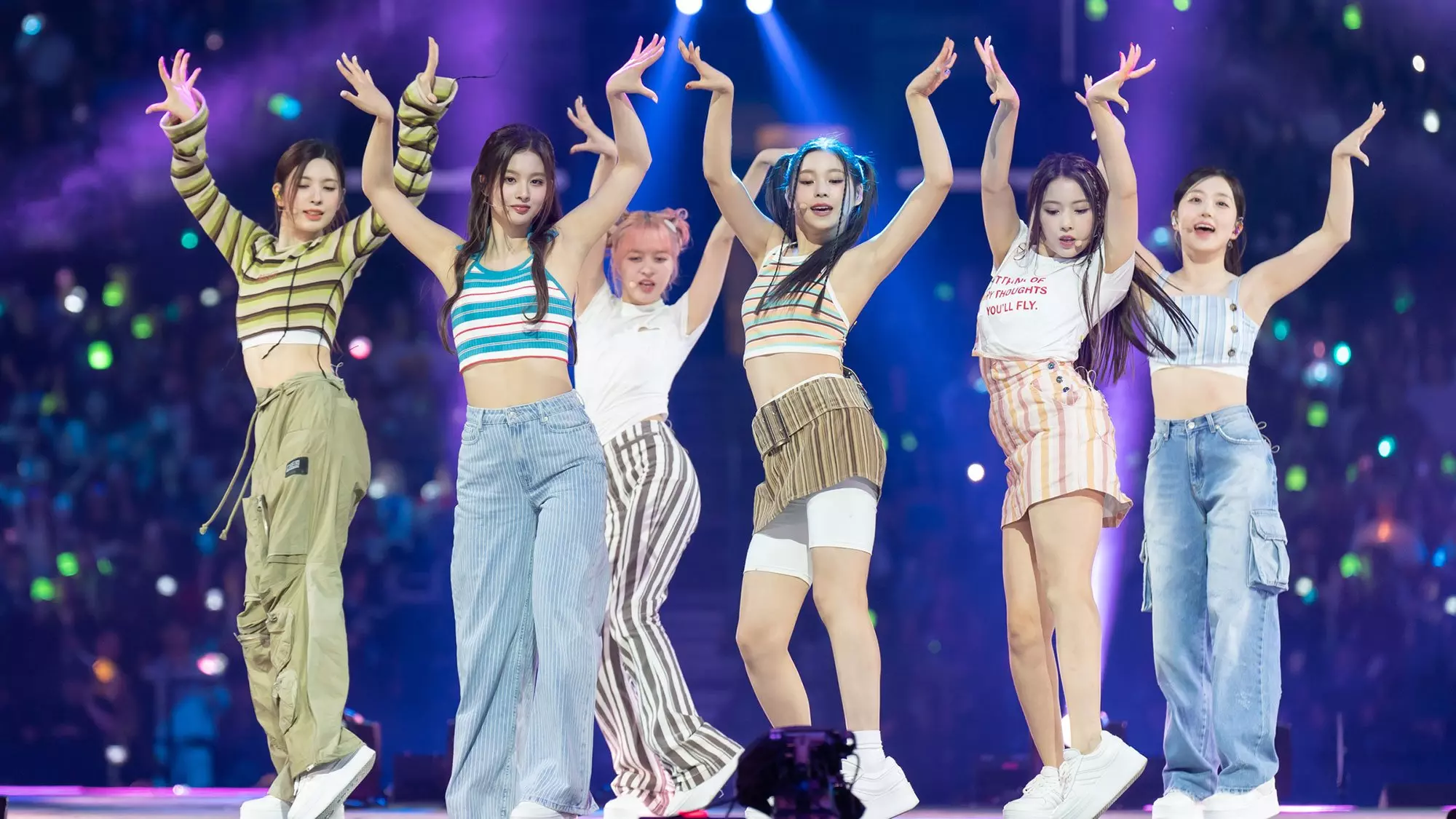
KCON L.A. 2024 Returns: Get Ready With This Playlist Featuring NCT 127, Zerobaseone, ENHYPEN, Zico & More
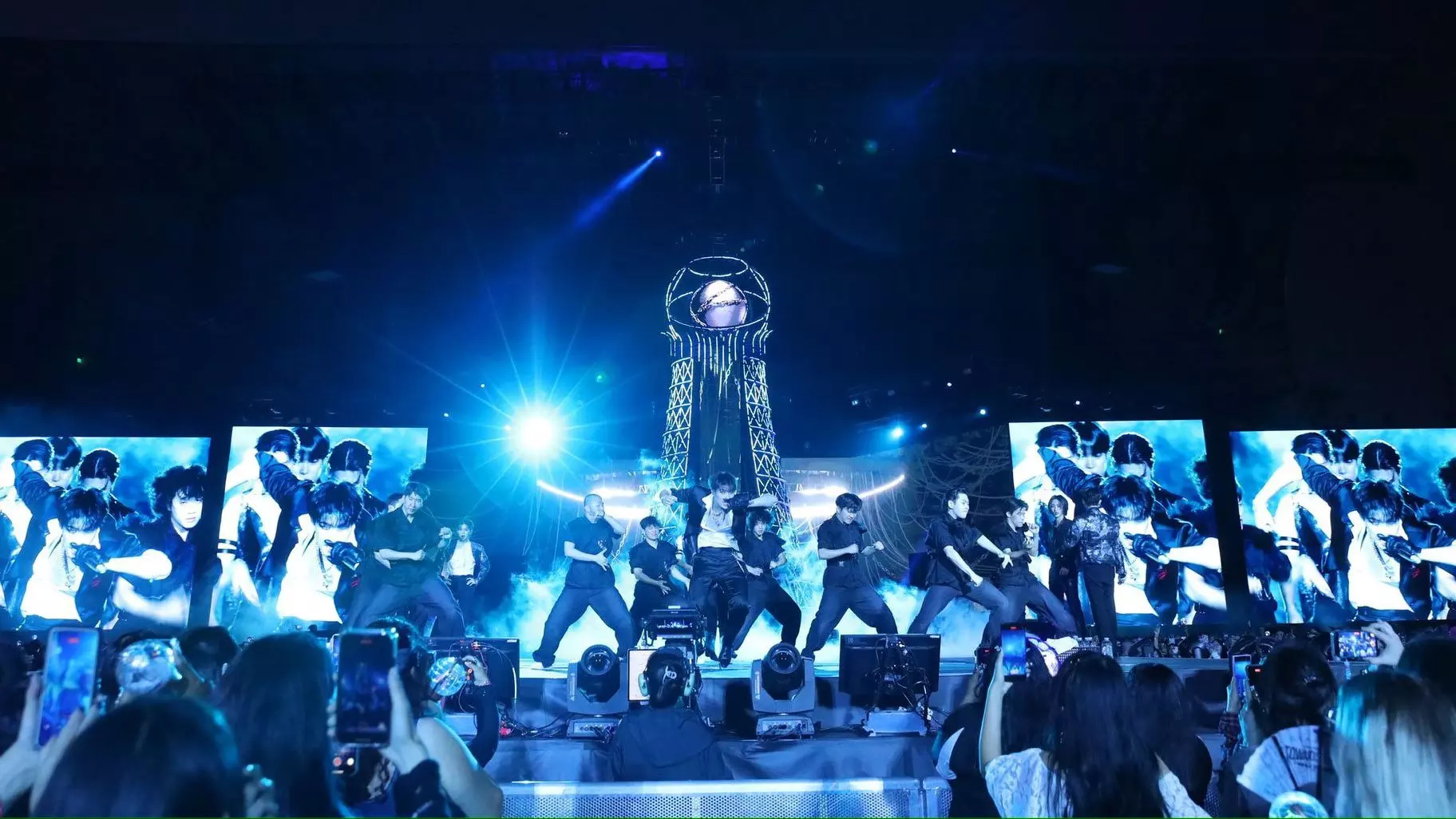
ATEEZ’s First U.S. Stadium Show Was A Triumph & Testament To Their Growth

5 Takeaways from BTS Jimin's New Album, 'MUSE': A Bold Exploration Of Love And Inspiration

NCT 127 Essential Songs: 14 Tracks You Need To Know From The K-Pop Juggernauts

ENHYPEN And JVKE "Say Yes" To Cross-Cultural Collabs & Exploring New Genres
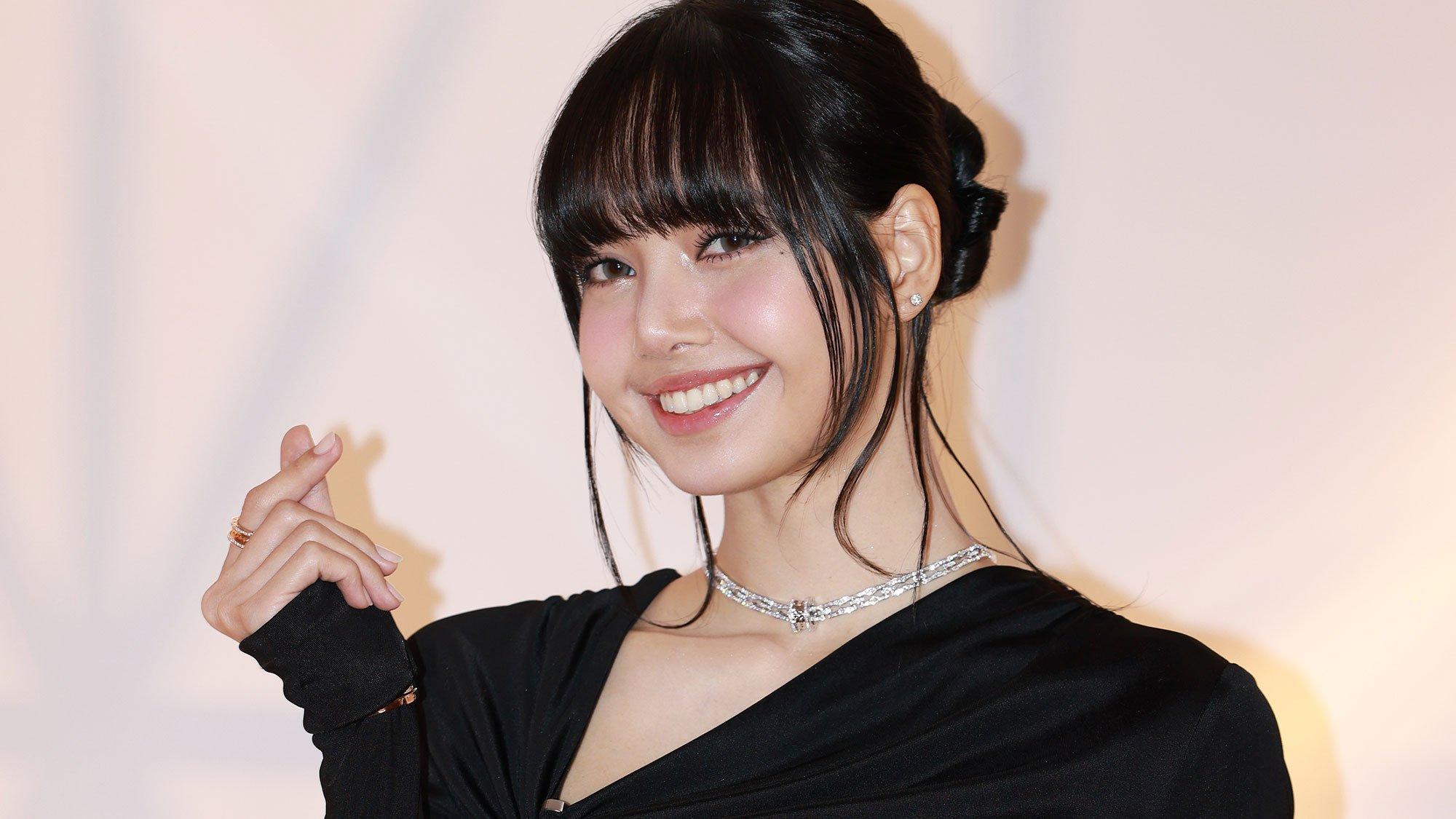
Photo: The Chosunilbo JNS/Imazins via Getty Images
list
New Music Friday: Listen To New Songs From LISA From Blackpink, Lil Nas X, Kelsea Ballerini, MC Lyte & More
Hot summer days require even hotter tunes. Here are some fresh-out-the-oven songs and albums by Hiatus Kaiyote, Lucky Daye, Headie One, Kaitlin Butts, and more.
We’ve been feeling the heat for a minute now, but summer is finally, officially, upon us.
What do you have on deck to soundtrack it? Perhaps you’re checking out Camila Cabello’s fourth offering, C,XOXO. Or Jxdn’s expectations-bucking new album, When the Music Stops. And there are so many other worthy candidates for your playlist — from Lupe Fiasco’s Samurai to Omar Apollo’s God Said No.
No matter where your stylistic compass points, this Friday release day has got something for you. As you gather your sunscreen and shades, let’s breeze through a cross-section of what’s out there.
LISA — "Rockstar"
K-pop loves its solo releases, showcasing how the various members of a group can shine individually while combining with ecstatic chemistry. Enter LISA, one-fourth of Korean titans BLACKPINK, who's already turned heads with her 2021 debut album, Lalisa.
"Rockstar" is another swing outside her main gig, featuring serrated chiptune production and LISA's commanding rap flow. The gritty, urban, futuristic video is a visual treat, and the chorus's boast of "Lisa, can you teach me Japanese?" is a multilingual flex — as well as a maddeningly unshakeable earworm.
Kelsea Ballerini & Noah Kahan — "Cowboys Cry Too"
The "Peter Pan" heavyweight and four-time GRAMMY nominee Kelsea Ballerini has called 2024 "a new chapter of music." Her collaboration with folk/pop singer/songwriter Noah Kahan, "Cowboys Cry Too," is the tip of the spear.
More than a month after the pair performed together at the 2024 Academy of Country Music Awards, their first recorded team-up is an aching, yearning ballad about breaking down a gruff exterior and revealing true emotions.
"Cowboys cry too/ They may not let 'em fall down in their hometown thinkin' they still got s*** to prove," Ballerini sings in the chorus. "That well runs deep/ But when he's showin' his skin, lettin' mе in, that's when he's toughest to mе."
Lil Nas X — "Here We Go!" (from the Netflix film 'Beverly Hills Cop: Axel F')
"So excited to release the best song of all time this friday!," Lil Nas X proclaimed on Instagram. (And on a Beverly Hills Cop soundtrack, no less!)
"Here We Go!" comes at an inflection point for the "J Christ" singer: "sorry I've been so scared with my art lately," he added in the same post. "I'm coming around to myself again. I will make you guys very proud."
This pro forma banger certainly inspires pride: tenacious lines like "I'm livin' and livin' I wanna die/ They tryna get even/ I'm beatin' the odds" will get under your skin. As for Beverly Hill Cop: Axel F, the Eddie Murphy joint will whiz to your screen July 3 via Netflix.
Lucky Daye — 'Algorithm'
Lucky Daye picked up a win for Best Progressive Album at the 2022 GRAMMYs, for Table for Two. After a slew of nominations for work with Beyoncé and Mary J. Blige, he's investigating the Algorithm.
The single "HERicane" was just a teaser, with songs like "Blame," featuring Teddy Swims; "Paralyzed," featuring RAYE;" and "Diamonds in Teal" expanding on and honing his soul-funk-R&B vision.
"Don't know pickin' sides/ 'Cause I'm rollin' in desire," he dreamily sings in the gently roiling "Diamonds in Teal." "I don't know which lie's true/ Or maybe I do, or maybe I'm you." It's a suitable mission statement wrapped in a stealthily seductive package.
Hiatus Kaiyote — 'Love Heart Cheat Code'
A jazzy, soulful, psychedelic band of Aussies, Hiatus Kaiyote has been wowing audiences for more than a decade. Whether through sampling or features, they've crossed paths with Drake, Anderson .Paak, and Beyoncé and Jay-Z.
Love Heart Cheat Code builds brilliantly on their last three albums: their 2012 debut Tawk Tomahawk, 2015's Choose Your Weapon, and 2021's Mood Valiant. Tracks like "Telescope," "Everything's Beautiful," and "Make Friends" are burbling brooks of atmosphere, groove and vibe.
Boulevards — 'Carolina Funk: Barn Burner on Tobacco Road'
Any fans of deep, pungent funk grooves should investigate Boulevards immediately. The project of mastermind Jamil Rashad, their new album Carolina Funk: Barn Burner on Tobacco Road tips its hat to yesterday's funk with a contemporary twist, bringing a refreshing spin on the well-trod template of syncopated basslines and stabbing horns.
Across highlights like "Do It Like a Maniac Part 1&2" and "Run & Move," Boulevards shows — once again — that few can nail this gritty sound quite like Rashad and crew.
Headie One — 'The Last One'
British drill-inflected MC Headie One first made a splash overseas with his 2023 debut album, Strength to Strength. Less than a year later, he's returning with The Last One.
Back in 2022, he hinted at the existence of his sophomore album in his non-album track "50s" — "The fans calling for 'Martin's Sofa'/ It might be the first single from my second," he rapped.
Helmed by that single, The Last One features Potter Payper, Stormzy, Fridayy, Skrillex, and more. The album is a leap forward in terms of production, scale and exploration.
Katlin Butts — 'Roadrunner!'
Any theater kid worth their salt knows at least a few bars from the musical "Oklahoma!"; country sensation Kaitlyn Butts has just unfolded it into an entire album.
"It's a love story but there's also a murder and a little bit of an acid-trippy feel to it at times; it's set in the same place where I come from," she said in a statement, noting she saw "Oklahoma!" with her parents every summer during childhood. "Once I got the idea for this album," she continued, "I couldn't believe I hadn't thought of it before, and it turned into something that completely encompasses who I am and what I love."
A laugh riot as well as a colorful, openhearted statement, Roadrunner! does the old Rodgers and Hammerstein chestnut good.
Read more: 5 Female Artists Creating The Future Of Country Music: Jaime Wyatt, Miko Marks & More
Amaarae — 'roses are red, tears are blue — Fountain Baby Extended Play'
Futurist Afropopper Amaarae made a gigantic splash with her second album, 2023's Fountain Baby — even Pitchfork gave it their coveted Best New Music designation.
That lush, enveloping album just got an expansion pack: roses are red, tears are blue — A Fountain Baby Extended Play is a continuation of its predecessor with six new songs. The oceanic "wanted," featuring Naomi Sharon, is a highlight, as is a remix of "Disguise" with 6LACK.
"Ooh, I'll be wanted/ I've been wanted," a pitch-shifted Sharon sings near the end, as if turning over the phrase. "Wanted" is one way to describe Amaraae's position in the music landscape.
Learn more: Meet The Latest Wave Of Rising Afrobeats Stars: AMAARAE, BNXN, Oladapo & More
MC Lyte — "King King" (feat. Queen Latifah)
The 50th anniversary of hip-hop may have come and gone, but hip-hop is forever. Today, legendary hip-hop pioneers MC Lyte and Queen Latifah continue to bear the flame of the genre as an elevating force with "King King," a conscious, uplifting offering.
"This is dedicated to all the kings and all the soon to be kings/ We're counting on you/ We love you/ This is for you, you and you and you," MC Lyte begins, while Latifah holds it down on the chorus with "This your crown hold it/ Even if it all falls down show it/ You know the world is watching now I know you get tired from keepin' it all together/ We need you."
During Women's History Month in March, MC Lyte released "Woman," the first single from her upcoming album, featuring hip-hop icons Salt (of Salt 'N Pepa), Big Daddy Kane, and R&B singer Raheem DeVaughn. MC Lyte's first new album in nearly a decade drops this summer; keep your eyes and ears peeled.
Learn more: 9 Teen Girls Who Built Hip-Hop: Roxanne Shante, J.J. Fadd, Angie Martinez & More
Latest News & Exclusive Videos

2024 Paris Olympics Opening Ceremony: Watch Celine Dion, Lady Gaga, Gojira & More Perform

Ice Spice Is The Drill Queen On 'Y2K!': 5 Takeaways From Her Debut Album

New Music Friday: Listen To New Songs From Halsey, MGK And Jelly Roll, XG & More

Watch Young MC Win Best Rap Performance In 1990

The Red Clay Strays Offer A New Kind Of Religion With 'Made By These Moments'

Photo: Astrida Valigorsky/Getty Images
list
9 New Pride Anthems For 2024: Sabrina Carpenter's "Espresso," Chappell Roan's "Casual" & More
Throughout the past year, a slew of music's brightest stars have blessed us with a batch of fresh songs that have quickly been embraced by the LGBTQIA+ community as classics, from Dua Lipa's "Houdini" to Troye Sivan's "One Of Your Girls."
Every June, Pride Month offers a time for the LGBTQIA+ community to reflect and raise awareness — but also, to party it up. While there were plenty of Pride anthems to pack playlists prior to this year, the past 12 months have seen some flawless new additions from a mix of fresh talent and long-standing stalwart artists that the queer community happily embraces.
While there's no set template on how to create an undeniable Pride anthem, there are major hallmarks: high-energy tempo, candid lyrics, delicious camp, and an undeniable groove. Between pop bops and dance floor jams, no Pride party is complete without at least a couple of the songs listed below. Cheers to the cathartic power of music to usher in another season of acceptance and equality.
Sabrina Carpenter — "Espresso"
You play it when you wake up. It's on the radio on the way to the club. It's playing at the club. Heck, it's even blasting at the gym the next day. 2024's newly crowned pop princess, Sabrina Carpenter, released an instant classic when she unfurled "Espresso" in April — more than enough time to learn the lyrics by Pride Month.
With an infectious melody targeting your ears like a jolt of morning caffeine, its steaming dose of memorable lines ("I'm working late/ 'cause I'm a singer") are the handiwork of Carpenter along with three veteran lyricists, including close collaborator Steph Jones, Amy Allen (Harry Styles, Selena Gomez) and Julian Bunetta, who is perhaps best known for his plethora of work with One Direction. "Espresso" marks further proof that if there's one thing Carpenter knows it's how to command an audience, whether through her captivating stage shows or viral, story-telling music videos that link together (including for recent single "Please, Please, Please").
Charli XCX — "360"
It's safe to say that Charli XCX is experiencing a new phase of her decade-long career as a critically acclaimed starlet. Her sixth studio album, BRAT, marks an evolution of her sound into a batch of adult tracks tailor-made for the club. As a result, it's spawned a number of viral memes among her legions of LGBTQIA+ fans, who have also boasted lime green avatars on social media in honor of what's being dubbed "brat summer."
It's no coincidence then that she'd release the project in the midst of Pride Month, led by the relentlessly pulsating single "360." With lyrics that have quickly already found itselves queer canon — "Drop down, yeah, Put the camera flash on" — the album boasts a hyperpoop energy and unapologetic individuality, making her recent spate of shows some of the hottest tickets in town.
Read More: Charli XCX's Road To 'Brat': How Her New Album Celebrates Unabashed Confidence & Eccentricity
Orville Peck, Diplo & Kylie Minogue — "Midnight Ride"
Giddy up! One of the brightest out stars in the LGBTQIA+ musical universe, the ever-masked Orville Peck has made a name for himself as a queer outlier in the country music scene. So it stands to reason that he'd partner up with none other than Kylie Minogue — who had the defining song of Pride '23 in the form of "Padam Padam" — for their own anthem for 2024. The result is "Midnight Ride," a whistle-powered, Diplo-produced earworm that's perfect for a rainbow-tinted hoedown.
The team-up is part of Peck's forthcoming duets project, for which he recruited a cavalcade of singing partners for queer-themed country-tinged tracks in a unique two-volume album dubbed Stampede (which drops in full Aug. 2). The collaborators include Willie Nelson, who croons with Peck on the eye-raising ditty "Cowboys Are Frequently Secretly Fond of Each Other."
Dua Lipa — "Houdini"
When Dua Lipa released Future Nostalgia in 2020, it became an instant classic in the pop world and LGBTQIA+ lexicon alike, cementing Lipa (and songs like "Don't Start Now" and "Physical") into the grand pantheon of queer playlist magic. The pressure was on, then, for her follow-up to live up to its commercial success and fandom.
Cue "Houdini," from this year's Radical Optimism, a cathartic dance floor anthem by one of the gay community's newer idols. Aside from setting the perfect tone for Pride Month with its delicious hook and refreshing confident lyrics "(Prove you got the right to please me"), in an interview with SiriusXM Hits 1, Lipa said the production of the track set the tone for the new project: "I was like, "Okay, I feel like now I know exactly what this album's gonna be and what it's gonna sound like."
The Challengers soundtrack
Who knew that a soundtrack to a tense and sultry tennis drama would yield an album fit for the dance floor? The thumping array of tunes that Trent Reznor and Atticus Ross churned out for Luca Guadagnino's Challengers has proved to be a hit beyond the film, with its synth-propelled soundtrack proving to be a unique and wild tracks, including the driving "I Know."
Its embrace in the LGBTQIA+ community should come as no surprise considering the single note the director gave Ross before he started work. "The way he described 'Challengers' was in a one-sentence email," Ross told Variety earlier this year. "Do you want to be on my next film? It's going to be super sexxy.' Two x's."
Ariana Grande — "yes, and"
Ariana Grande is no stranger to gay-friendly anthems; in fact, she delivered one of 2020's most iconic Pride moments with her Lady Gaga duet, "Rain On Me." When her album eternal sunshine dropped earlier this year, it was no surprise that she'd offer a few more bops for a Pride playlist.
Among them is "yes, and," a Max Martin-produced hit that can get even your stiffest friend moving on the dance floor. Perhaps it's no coincidence, then, that the creative team took the sonic elements of ballroom culture — a uniquely queer LGBTQIA+ experience — and fused them with lyrics perfect for a personal Pride anthem. "Say that s— with your chest," she croons. We will, Ari!
Read More: Listen To GRAMMY.com's 2024 Pride Month Playlist Of Rising LGBTQIA+ Artists
Peggy Gou — "(It Goes Like) Nanana"
If you've been on a dance floor in the recent past, odds are you've grooved to nostalgic beats courtesy the South Korean producer Peggy Gou. The breakout star is known for her unique brand of throwback dance jams, which carry a distinct '90s-era flavor that has led her to be embraced in queer spaces from Fire Island to West Hollywood. The most infectious, "(It Goes Like) Nanana").... samples the German artist ATB's 1998 track "9 PM (Till I Come)," no doubt a reaction to the recent revitalization of 90s-era culture popular in the LGBTQIA+ community, which provides a thumping link to queer culture past.
"For me, the DJ is someone who teaches people the value of music and educates them," Gou told L'Official of her musical mission. "It is someone who transmits a beautiful memory and is somehow responsible for it."
Chappell Roan — "Casual"
While Roan has been a bubbling-under singer/songwriter for a handful of years, 2024 has proved to be decidedly her time to shine. Ever since the release of her debut album, 2023's The Rise and Fall of a Midwest Princess, her back catalog has logged impressive streaming numbers, and she's commanded massive crowds at the likes of Governor's Ball and Bonnaroo.
Part of her appeal comes from her unabashed candidness about her sexuality (Roan identifies as a lesbian) and resilience. Both are exemplified by her single "Casual," which is about a relationship that doesn't seem to get all that serious, for better or worse.
However, Roan told the Associated Press last year that normally she isn't so sexually candid. "The songs kind of give me the opportunity to act like that, and say that, and dress like that," she explained. "It's mainly to piss off — it's all a rebellion. That's what it is. It is very empowering, I think, for a lot of people. ... It's just not as empowering to me as it is living out a fantasy."
Read More: Chappell Roan's Big Year: The 'Midwest Princess' Examines How She Became A Pop "Feminomenon"
Troye Sivan — "One Of Your Girls"
By now, we've all heard Troye Sivan's infectious hit "Rush" or seen its viral music video — both of which earned the singer his first GRAMMY nominations this year. In the interim, his 2023 album, Something to Give Each Other, is filled with plenty of other tracks that speak intimately and eloquently about the queer experience.
Take, for example, the luscious "One Of Your Girls," a meditation on when a gay man has a transactional fling with an otherwise straight person. It subsequently has turned into yet another queer definitive anthem for the Australian star.
As a result, Sivan has turned into one of the musical heroes of the community: not only unabashedly talented, but an eloquent chronicler of the gay experience. Even better, as he told NPR last year, his queer-focused projects are as cathartic for him as they may be for listeners. "There's a big element of pride in the fact that I am now so comfortably, openly gay."
PRIDE & Black Music Month: Celebrating LGBTQIA+ & Black Voices
Listen To GRAMMY.com's 2024 Pride Month Playlist Of Rising LGBTQIA+ Artists
9 New Pride Anthems For 2024: Sabrina Carpenter's "Espresso," Chappell Roan's "Casual" & More
What's The Future For Black Artists In Country Music? Breland, Reyna Roberts & More Sound Off
Why Beyoncé Is One Of The Most Influential Women In Music History | Run The World
9 Ways To Support Black Musicians & Creators Year-Round
How Beyoncé Is Honoring Black Music History With 'Cowboy Carter,' "Texas Hold Em," 'Renaissance' & More
The Evolution Of The Queer Anthem: From Judy Garland To Lady Gaga & Lil Nas X
15 LGBTQIA+ Artists Performing At 2024 Summer Festivals
50 Artists Who Changed Rap: Jay-Z, The Notorious B.I.G., Dr. Dre, Nicki Minaj, Kendrick Lamar, Eminem & More
Fight The Power: 11 Powerful Protest Songs Advocating For Racial Justice

How Rihanna Uses Her Superstardom To Champion Diversity | Black Sounds Beautiful

How Beyoncé Has Empowered The Black Community Across Her Music And Art | Black Sounds Beautiful
5 Women Essential To Rap: Cardi B, Lil' Kim, MC Lyte, Sylvia Robinson & Tierra Whack
Celebrate 40 Years Of Def Jam With 15 Albums That Show Its Influence & Legacy

Watch Frank Ocean Win Best Urban Contemporary Album At The 2013 GRAMMYs | GRAMMY Rewind
A Brief History Of Black Country Music: 11 Important Tracks From DeFord Bailey, Kane Brown & More
10 Women In African Hip-Hop You Should Know: SGaWD, Nadai Nakai, Sho Madjozi & More
10 Artists Shaping Contemporary Reggae: Samory I, Lila Iké, Iotosh & Others
The Rise Of The Queer Pop Star In The 2010s
How Sam Smith's 'In The Lonely Hour' Became An LGBTQIA+ Trailblazer
How Queer Country Artists Are Creating Space For Inclusive Stories In The Genre

How Jay-Z Became The Blueprint For Hip-Hop Success | Black Sounds Beautiful

How Kendrick Lamar Became A Rap Icon | Black Sounds Beautiful
Dyana Williams On Why Black Music Month Is Not Just A Celebration, But A Call For Respect
6 LGBTQIA+ Latinx Artists You Need To Know: María Becerra, Blue Rojo & More
7 LGBTQ+ Connections In The Beatles' Story
Breaking Down Normani's Journey To 'Dopamine': How Her Debut Album Showcases Resilience & Star Power
10 Alté Artists To Know: Odunsi (The Engine), TeeZee, Lady Donli & More

Celebrating Black Fashion At The GRAMMYs Throughout The Decades | Black Music Month
FLETCHER Is "F—ing Unhinged" & Proud Of It On 'In Search Of The Antidote'
For Laura Jane Grace, Record Cycles Can Be A 'Hole In My Head' — And She's OK With That
15 Essential Afrorock Songs: From The Funkees To Mdou Moctar
50 Years In, "The Wiz" Remains An Inspiration: How A New Recording Repaves The Yellow Brick Road
Why Macklemore & Ryan Lewis' "Same Love" Was One Of The 2010s' Most Important LGBTQ+ Anthems — And How It's Still Impactful 10 Years On
Songbook: The Complete Guide To The Albums, Visuals & Performances That Made Beyoncé A Cultural Force

Why Cardi B Is A Beacon Of Black Excellence | Black Sounds Beautiful
Queer Christian Artists Keep The Faith: How LGBTQ+ Musicians Are Redefining Praise Music
9 Revolutionary Rap Albums To Know: From Kendrick Lamar, Black Star, EarthGang & More
9 "RuPaul's Drag Race" Queens With Musical Second Acts: From Shea Couleé To Trixie Mattel & Willam
5 Black Artists Rewriting Country Music: Mickey Guyton, Kane Brown, Jimmie Allen, Brittney Spencer & Willie Jones
How 1994 Changed The Game For Hip-Hop

How Whitney Houston’s Groundbreaking Legacy Has Endured | Black Sounds Beautiful
LGBTQIA+-Owned Venues To Support Now

Celebrate The Genius Of Prince | Black Sounds Beautiful

Explore The Colorful, Inclusive World Of Sylvester's 'Step II' | For The Record
Black-Owned Music Venues To Support Now
5 Artists Fighting For Social Justice Today: Megan Thee Stallion, Noname, H.E.R., Jay-Z & Alicia Keys
Artists Who Define Afrofuturism In Music: Sun Ra, Flying Lotus, Janelle Monae, Shabaka Hutchings & More
5 Trans & Nonbinary Artists Reshaping Electronic Music: RUI HO, Kìzis, Octo Octa, Tygapaw & Ariel Zetina
From 'Shaft' To 'Waiting To Exhale': 5 Essential Black Film Soundtracks & Their Impact
5 Emerging Artists Pushing Electronic Music Forward: Moore Kismet, TSHA, Doechii & Others
5 Artists Essential to Contemporary Soca: Machel Montano, Patrice Roberts, Voice, Skinny Fabulous, Kes The Band

How Quincy Jones' Record-Setting, Multi-Faceted Career Shaped Black Music On A Global Scale | Black Sounds Beautiful
5 Black Composers Who Transformed Classical Music
Brooke Eden On Advancing LGBTQ+ Visibility In Country Music & Why She's "Got No Choice" But To Be Herself
Let Me Play The Answers: 8 Jazz Artists Honoring Black Geniuses
Women And Gender-Expansive Jazz Musicians Face Constant Indignities. This Mentorship Organization Is Tackling The Problem From All Angles.

Histories: From The Yard To The GRAMMYs, How HBCUs Have Impacted Music
How HBCU Marching Band Aristocrat Of Bands Made History At The 2023 GRAMMYs
